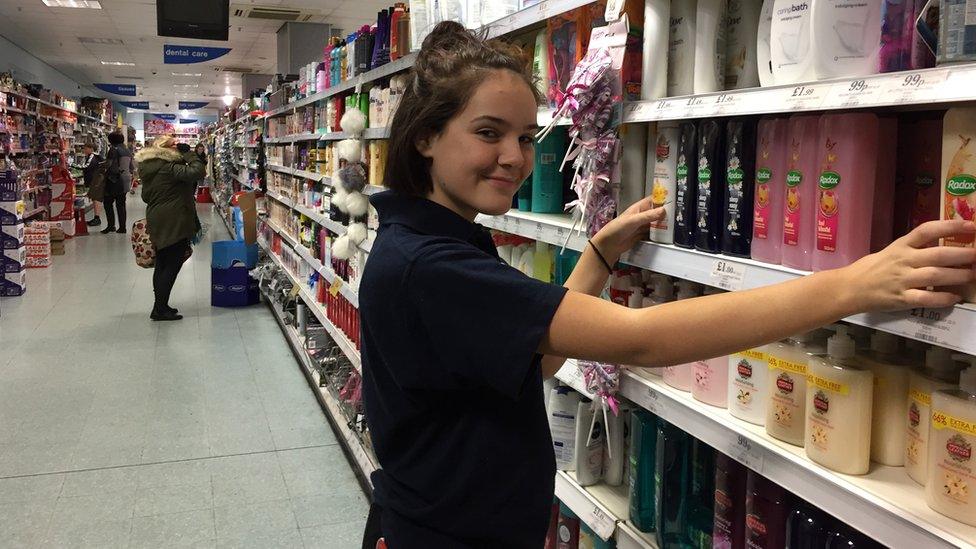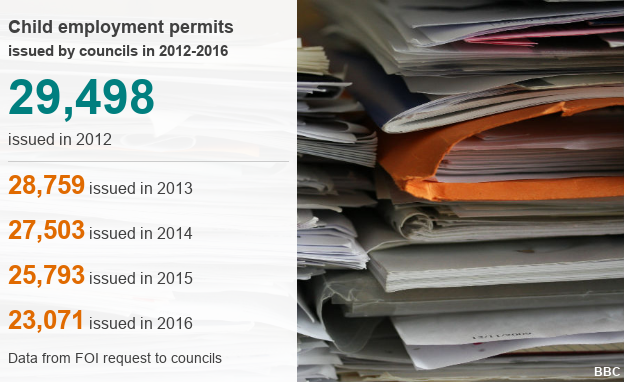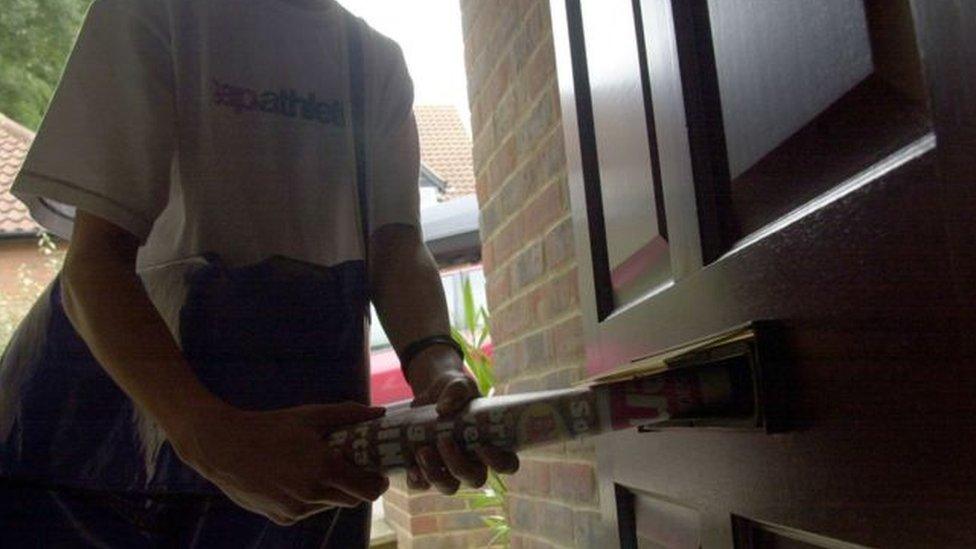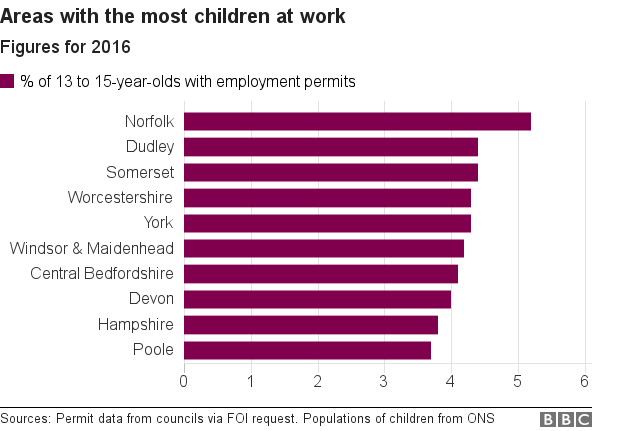Are Saturday jobs less popular among teenagers now?
- Published

Rachel, 13, says she manages to balance her part-time job and school work
A Saturday job used to be a rite of passage for many children, but pressure to succeed at school and other factors means that's no longer the case.
The number of schoolchildren with a part-time job has fallen by a fifth in the past five years, new figures show.
The findings come from a Freedom of Information (FOI) request to all local authorities across the UK responsible for issuing child employment permits.
Employers need to apply for a licence to hire staff under the age of 16.
More than 140 authorities responded to the FOI with the numbers of permits issued in 2012 up to 2016, which showed a steady decline over that period.
The number of permits fell by more than 20 percentage points between 2012 and 2016 - from 29,498 to 23,071.

Dr Angus Holford from the Institute for Social and Economic Research at the University of Essex said he believed young people in compulsory education are fearful that a part-time job could hinder their performance at school.
"Teens are being told evermore that you need to get good GCSEs and A-levels to get a good job in the long term," he said.
"Passing the exams you need now is looming larger in people's concerns."
Geoff Barton, general secretary of the Association of School and College Leaders, said: "Properly regulated part-time work is a good way of helping young people learn skills that they will need in their working lives.
"It is vital that young people, and their parents, ensure that any part-time work they are undertaking leaves them with sufficient time for study and rest."

Krishan started a part-time job at age 15, working in a cafe at weekends
But the drop in children working part-time isn't just about academic pressures, it's also due to changing consumer habits.
One of the biggest drops in employment permits being issued was in Middlesbrough. In 2011, 101 permits were issued to 13 to 15-year-old children there, but in 2016 the number was just seven.
The council said the "massive drop" was due to a decline in the number of people in the area who had a newspaper delivered to their door.
Gareth Lewis, the chair of the National Network for Children in Employment and Entertainment, which sets guidelines and good practice for employers, said it was beneficial for children to have some form of part-time work.
"(This decline) is not something we have been made aware of … it is hard to see why there may be a trend."

Middlesbrough Council said the decline in the number of permits being issued for employing children was down to a drop in demand for newspaper deliveries
Rachel, 13, works in a discount shop in Manchester. She said: "I enjoy my job because I'm earning money and it helps my confidence speaking to people and socialising with people I work with.
"I have to be quite organised with my homework, so I'll often do some at lunchtimes and then do the rest as soon as I get home from work."
Krishan started his first job at 15 working in a cafe in Cirencester, Gloucestershire. He has just turned 16.
"I really wanted to gain my own sense of independence and I thought that getting a job would be a good way to do that.
"I enjoy the sense of freedom it gives me because I'm able to make money as well as have free time to meet my friends."
Where are the top areas for children at work?

Norfolk County Council issued 1,376 permits in 2016. This was equivalent to just over one in every 20 children (5.2%) aged 13 to 15.
Dudley in the West Midlands had 471 permits, equivalent to 4.4% of 13 to 15-year-olds.

Can a part-time job lead to adult success?

Sir Martin Sorrell's dad gave him a part-time job while he was at school
Is having a part-time job early on in life a marker for future professional success? Sir Martin Sorrell, chief executive of advertising and public relations firm WPP, told the BBC: "I was very lucky. My dad gave me a part-time job whilst at school. I was a salesman in one of his stores in Harlesden, selling radios, TVs, radiograms, fridges and vacuum cleaners, amongst other electrical accessories.
"I also spent several weeks reviewing credit analyses for hire-purchase agreements ... business was an inherent part of our lives, perhaps to an unusual degree. There weren't many other kids who read the Financial Times on the bus to school."
Has your Saturday job led to a full-time position? email haveyoursay@bbc.co.uk, external

Preparing for work
Some research has even shown that not taking on a Saturday or holiday job could be detrimental to a person later on.
A 2015 study by the UK Commission on Employment and Skills found that not participating in part-time work at school age had been blamed by employers' organisations for young adults being ill-prepared for full-time employment. It also said this had negative implications for workforce productivity.
Employment regulations state that work for 13 to 15 year-olds must be light duties only and between the hours of 7am and 7pm (including holidays).
Jobs that need a permit include retail work, newspaper rounds, waiting on tables, office or clerical work, and leaflet delivery. The rules are different for baby-sitting or the odd job for families and individuals.
More about this story
Data on the number of permits issued by local authorities was gathered by the BBC using the Freedom of Information Act.
Daniel Wainwright of the BBC England Data Unit then used the official population estimates published by the Office for National Statistics, external to calculate the rate of employment of 13 to 15-year-olds in each area in 2016.
- Published20 September 2010
